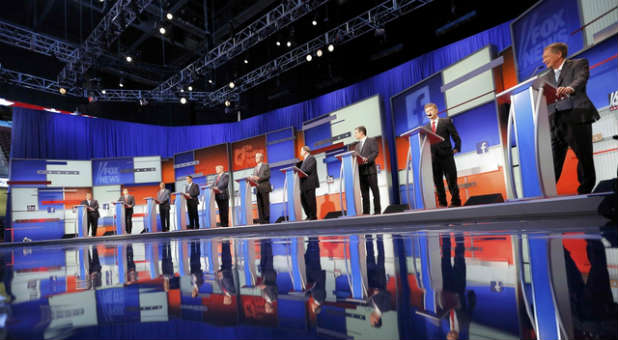Who Won the GOP Debate?
Yesterday was an unprecedented day in American politics. Two presidential debates were held, encompassing 17 candidates, the most in our history. Ten more debates are scheduled for Republican candidates. The Democrats have announced that they will hold six debates.
Carly Fiorina overtook Donald Trump on Google searches after the debates, which is good news for her campaign. I watched both debates, and thought there were no clear winners or losers.
So, who really won last night’s debate? We did.
America has been through 57 presidential elections. Each has produced a peaceful result. (One can argue that the 1860 election led to the Civil War, but many historians believe that secession was likely regardless of the outcome.) Why does the process work?
Not because these contests are harmonious. The opposite is almost always true, in fact. In the 1800 election, for instance, a newspaper supporting John Adams suggested that Thomas Jefferson would create a nation where “murder, robbery, rape, adultery and incest will be openly taught and practiced.” Not to be outdone, a newspaper supporting Jefferson wrote that Adams “behaved neither like a man nor like a woman but instead possessed a hideous hermaphroditical character.” (I had to look “hermaphroditical” up—it’s not a compliment.)
Rather, our system continues to work because of its design. In the participatory “democracy” our founders created, the people “(demos”) are empowered (“cracy”). It’s been said that “in democracy, it’s your vote that counts; in feudalism, it’s your count that votes.” Why is the power of the popular vote so critical?
In The Weight of Glory, C.S. Lewis noted that we need democracy, not because we are all so good that we deserve to participate in our government, but because we are all so bad that none of us can be trusted with power. Our system reflects the theological doctrine of total depravity, the belief that each of us is fallen, infected and affected by sin.
So we need a process that empowers the people to restrain the empowered. For 239 years, our process has worked.
But here’s the danger: if we stop using this power, we will lose it. In voter turnout, the U.S. now ranks 29th out of 31 democracies surveyed. Even worse, turnout for non-presidential election years falls as much as 20 percentage points lower. If our people do not participate actively in our government, our government will eventually fail.
That’s why we need more presidential candidates, not fewer. We need more presidential debates, more voter involvement, more engagement in the political process all year. While I disagree with Ralph Nader on many issues, I affirm completely his assertion, “There can be no daily democracy without daily citizenship.”
The same is true of Christianity. Our faith is a race to finish, a fight to win (2 Tim. 4:7). It is a daily commitment to Christ as our King. If we are not advancing, we are retreating. We are like bike riders on a hill—we either go up, or we go down.
Which is true of your soul today?
Ronald Reagan warned, “Freedom is never more than one generation away from extinction.” He could have said the same of the Christian faith. Thomas Carlyle was right: “Men do less than they ought, unless they do all that they can.”
Jim Denison, Ph.D., is founder of the Denison Forum on Truth and Culture, a non-sectarian “think tank” designed to engage contemporary issues with biblical truth. Join over 100,000 who read Dr. Denison’s daily Cultural Commentary: denisonforum.org/subscribe. For more information on the Denison Forum, visit denisonforum.org. To connect with Dr. Denison in social media, visit twitter.com/jimdenison or facebook.com/denisonforum.




























